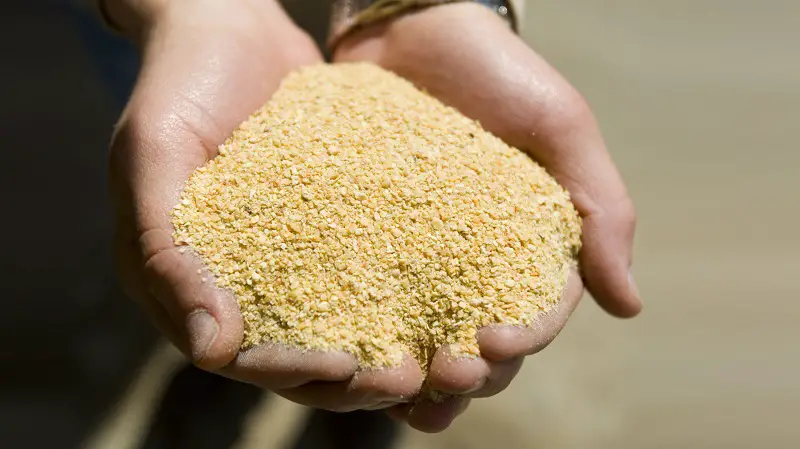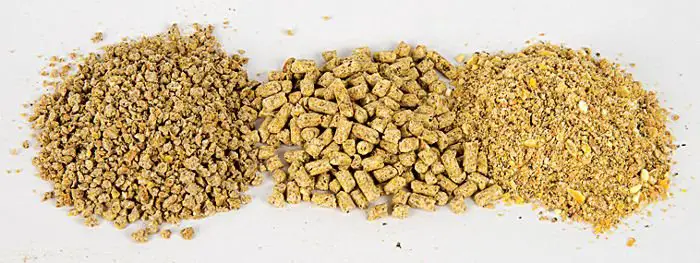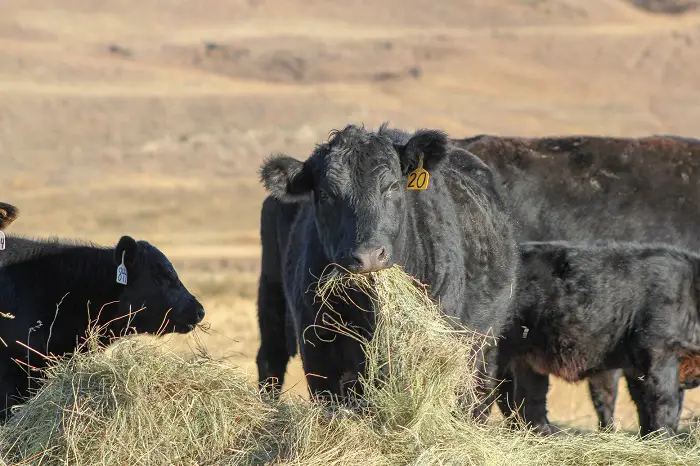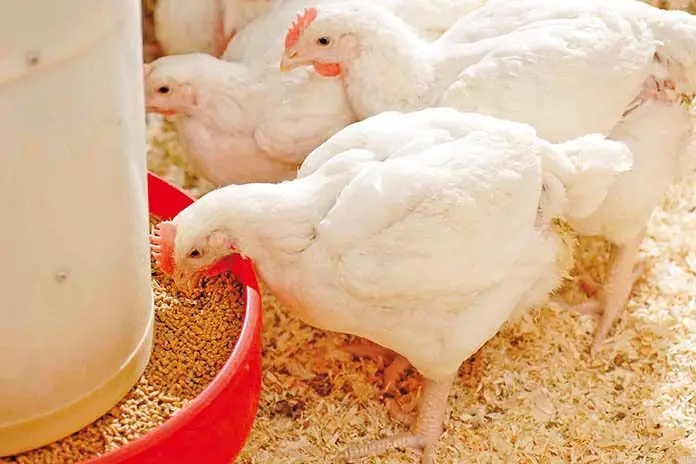Soymeal is a very important raw material when it comes to feeding pigs providing the bulk of protein in pig feeds globally. Soybean meal is rich in protein at above 43% and in the essential amino acids lysine, threonine, and tryptophan which are deficient in cereal grains. Soymeal can also be an energy source for pigs depending on the amount of fat left after processing. Pigs will not do well on raw soybean due to chemicals in the raw soybean which affect digestion, so two key products are processed to make the soybeans usable in pig feed. The idea behind soybean processing is to destroy the anti-nutritional factors in the raw soybean called trypsin inhibitors, these are protein in nature and can be destroyed by applying heat to the soybean. However, care should be taken not to apply too much heat as this can also destroy other important proteins reducing the soybean meal digestibility and overall feeding value.
Contents
Processing
Most soybean is processed into soymeal in the oil extraction industry for vegetable fats for human consumption. The soybeans are toasted, crushed into flakes, and passed through a solvent to extract oil from the flakes. Cooking of soybeans can be done using dry heat or wet heat through extrusion using, an extruder. Oil can also be pressed out of the soybean using a mechanical screw press after cooking. Cooked soybeans can be fed directly to pigs, and most farmers still do, but the performance of pigs can be improved by further processing. These processes produce 3 different types of soybean meal with varying proportions of protein and energy.
Table 1: Typical Nutrient Analysis Soybean Products
| Parameter | Unit | Extruded Full fat Soymeal | Dehulled Soymeal | Non- Dehulled Soymeal |
| Dry Matter | % | 93.85 | 89.98 | 88.79 |
| Crude Protein | % | 44.56 | 47.73 | 43.90 |
| Ether Extract | % | 5.69 | 1.52 | 1.24 |
| Ash | % | 5.7 | 6.27 | 6.38 |
| Net Energy | MJ/kg | 13.8 | 11.0 | 9.4 |
The removal of oil from the soybean improves the crude protein content of the resultant soybean meal while reducing the energy content. Fat is a very efficient energy source in the feeding of growing pigs on average a one percent inclusion of fat has a two percent improvement in feed efficiency. The feeding of extruded full-fat soybean meal can improve both the growing pig weight gains and feed price in a pig operation. Extrusion raptures the oil vesicles which frees up the oil making it more available to pigs. The benefits of the additional fat are an improvement in feed density, reduction in feed dustiness, palatability, and grinding efficiency in the feed factory. It is important then to know which soymeal the pigs are being fed on for the best results to be obtained. Once the type is known the level of processing also needs to be known as over or under-processing has effects on the growth performance of pigs.
Variability of Soybean Meal
The quality of soybean meal is very varied according to source, this is because of the type and level of processing. Soybean meal from the same country but different factories can have different qualities, different countries also have different qualities. Various studies have been conducted to evaluate the impact of these differences in soybean meal quality on pig performance. Just a quick comparison of three (3) samples of solvent-extracted soymeal from two (2) from country A and one (1) from country B
| Parameter | Dehulled Soymeal Country A (1) | Dehulled Soymeal Country A (2) | Soymeal Country B |
| Crude Protein | 47.1 | 47.4 | 39.6 |
| Ether Extract | 2.46 | 0.74 | 0.84 |
| Crude Fiber | 4.60 | 5.70 | 5.10 |
This variability in quality is one area that needs careful consideration when using soymeal in pig feeds as soybean is included in high levels in pig feed. Any swings up or down in protein and energy impact the feed considerably, however, the main concern of soymeal as a pig feed source is the issue with anti-nutritional factors in the soymeal.
Potential Issues of Feeding Soybean Meal to Pigs
Raw soybeans contain trypsin inhibitors and lectins which affect protein digestibility in the digestive system of the pig affecting growth. These anti-nutritional factors are destroyed by heat processing the soybeans before oil extraction or any other further processing. Feeding under processed soymeal will expose the pigs to trypsin inhibitors leading to reduced growth rates. Over-processed soymeal has limited protein digestibility as most of the proteins will have been damaged by excessive heat treatment. More than half of all the phosphorus in soymeal is bound up in phytic acid which is unavailable to pigs unless a phytase enzyme is fed in the pig feed to break up the phytic acid.
Evaluating the Quality of Soybean Meal
Before feeding soymeal to pigs it is thus important to test the quality of the soymeal so that appropriate action can be taken on how to use the soymeal. Farmers can do a simple cresol dye test to evaluate the quality of processing by checking the activity of another anti-nutrition factor, urease, the more urease in a sample the lower the processing.
Inclusion Levels
Properly processed soymeal can be included in pig feed for pigs of all ages up to thirty percent inclusion in the final diet. For piglets, a maximum of 20% is acceptable while in growing and adult pigs depending on price 30% soybean meal can be added. Soymeal can be an expensive raw material for pig feeding, especially in countries that are not food secure soybeans are also used for providing food for humans, and alternatives have to be sought in such cases usually using locally available resources.
Alternatives
Depending on local availability the following oil seeds can be used to replace soymeal: sunflower, sesame, peanut, and cottonseed meals can be used to replace up to 50% of soymeal. Animal sources of protein can also be used in varying amounts to replacing soymeal, although their inclusion is mostly limited by price.
Soymeal is by far the biggest source of protein source in pig feeding with a high-density protein, superior amino acid profile, and ability to supply energy all in one. The constraints to feeding soymeal are out weighted by the advantages of the raw material, all across the globe soymeal is still the most preferred protein source for pigs.




